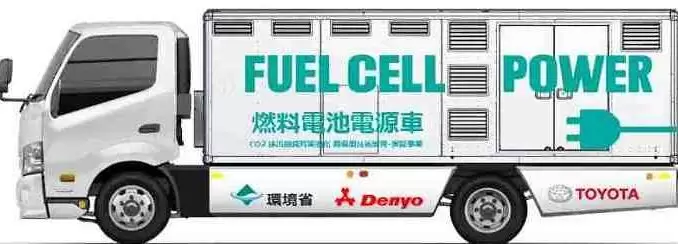
Views: 13
– Denyo and Toyota jointly develop and initiate verification tests for a fuel cell power supply vehicle that uses hydrogen to generate electricity. Environmentally friendly vehicle reduces CO2 emissions, provides continuous power for approximately 72 hours during disasters
Minapim by Hernan Valenzuela: Denyo Co., Ltd. (Denyo) and Toyota Motor Corporation (Toyota) announced that they have jointly developed a fuel cell power supply vehicle that uses hydrogen to generate electricity.
As a leading manufacturer of mobile (portable) generators, Denyo will work with Toyota to initiate verification tests with the aim of marketing them and helping to create a sustainable society, which is one of the objectives of the Sustainable Development Goals – SDGs.
The project was selected by the Ministry of Environment of Japan as a “Low Carbon Technology Research and Development Program“.
Denyo and Toyota are actively engaged in efforts for the global environment, as they regard related problems as important issues for management. As such, they jointly developed the fuel cell energy delivery vehicle based on the belief that efforts are needed to apply fuel cell technologies to commercial and industrial vehicles to further reduce CO2 emissions.
The companies also looked for other possibilities of use in which electrified vehicles are able to provide added value as a large-scale energy supply, providing electricity when and where it is needed in a variety of scenarios, including areas hit by power-off disasters and locations entertainment, such as open-air concerts.
Many current-generation power supply vehicles use diesel engines to power the vehicle on the road and when generating electricity. Using fossil fuels as energy, they emit substances of environmental concern when driving and generating electricity, including greenhouse gases, carbon dioxide (CO2) and nitrogen oxide (NOx).
Fuel cell vehicles, on the other hand, use fuel cells to provide energy. This eliminates the emission of substances with a harmful environmental impact, allows up to approximately 72 hours of continuous energy supply and provides water for showers and other uses as a by-product of power generation.
The Toyota / Denyo fuel cell vehicle that was developed together this time is based on Toyota’s “Dyna” light trucks, equipped with Toyota’s Mirai Fuel Cell Electric Vehicle (FCEV) fuel cell system as a power source.
For its feeding unit, it uses fuel cell feeding equipment developed by Denyo as part of a program subsidized by the Ministry of the Environment. The vehicle also carries about 65 kg of hydrogen (in 27 hydrogen tanks) to travel long distances and generate energy for long periods of time.
Verification tests for the vehicle will begin in September 2020. It will be compared with conventional engine-based power generators to verify the unique characteristics of vehicles with fuel cell power supply, including their impact on various load equipment and reductions CO2 emissions.
As a socially responsible company, Denyo is actively involved in commercial activities that are in harmony with the environment and will also continue to actively develop products based on fuel cells as a leading manufacturer of mobile (portable) generators.
Toyota wants to dramatically reduce CO2 emissions on the roads, which is one of its activities to help create the sustainable society targeted by the SDGs. To this end, the company will continue to work hard to develop and promote the use of electrified vehicles, moving forward.
Basic Toyota / Denyo fuel cell power supply vehicle specifications
- Vehicle length: 6,380 – Width: 2,220 – Maximum ground clearance: 2,240 m – Total weight 7,265 t
- Hydrogen capacity Number of high pressure hydrogen tanks 27
- Internal tank volume 1,626 liters
- Hydrogen storage mass approximately 65 kg
- Power supply Nominal output 8.5 kW (three-phase and full single-phase output)
- Feeding capacity of approximately 612 kWh
- Nominal voltage / number of phases / frequency 100/200 VAC / three-phase four-wire and single-phase three-wire / 50/60 Hz
- Continuous power supply (maximum output during generation: 8.5 kW) Approximately 72 hours
- Water generation (maximum amount generated) Approximately 450 liters
- Note that the duration of the above power supply is estimated on the condition that the Fuel Cell Power Supply Vehicle supplies power after ensuring the amount of hydrogen driving for 100 kilometers round trip and 200 kilometers round trip.
About Toyota:
Toyota Motor Corporation works to develop and manufacture innovative, safe and high-quality products and services that create happiness by providing mobility for everyone. We believe that the real achievement comes from supporting our customers, partners, employees and the communities in which we operate. Since our foundation, more than 80 years ago, in 1937, we have applied our Guiding Principles in search of a more secure, ecological and inclusive society. Today, as we become a mobility company developing connected, automated, shared and electrified technologies, we also remain true to our Guiding Principles and many of the United Nations’ Sustainable Development Goals to help bring about an increasingly better world, where everyone is free to move.
Related article: At the bottom of Mt. Fuji Toyota will build city of the future